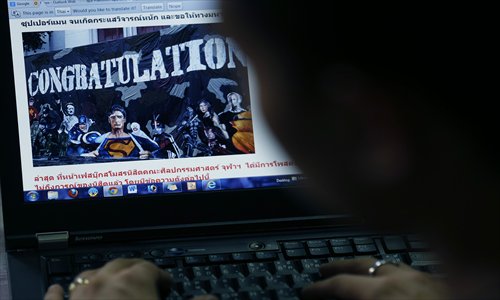HOME >> WORLD
Why Hitler is hip in Thailand
By Han Shuo in Bangkok and Wang Zhaokun in Beijing Source:Global Times Published: 2013-8-21 23:38:02

A Thai person looks at a website displaying a picture of a mural on campus depicting Adolf Hitler along with several comic book heroes inside, in Bangkok on July 16. Photo: CFP
One of Thailand's leading universities apologized in July after its students displayed a large billboard depicting Adolf Hitler among a host of comic book superheroes during graduation celebrations.
Bangkok's Chulalongkorn University expressed its "deep regret" over the painting, which appeared in July and featured Superman, Batman and the Incredible Hulk as well as the genocidal Nazi leader.
In a letter to the Simon Wiesenthal Center, the Jewish human rights and Holocaust memorial organization, the university said the students who created it were "unaware of its significance" and had received a verbal warning.
Rabbi Abraham Cooper, associate dean of the center, questioned whether "a genocidal hate monger" was an appropriate role model for Thai young people.
"The Simon Wiesenthal Center is outraged and disgusted by this public display at Thailand's leading school of higher education," he said.
This was not the first time images of Hitler in Thailand have caused controversy and sparked outrage.
In June, a fried chicken restaurant in Thailand replaced KFC's Colonel Sanders' face with Hitler's in its logo, prompting KFC to threaten legal action against the shop. Hitler's cartoon images can also be seen on many T-shirts in Thailand.
Back in 2011, students at a high school in Chiang Mai dressed in Nazi uniforms marched in the opening ceremony of a sports meeting.
Cool over correct
Lee Chian Siong, director for Community Affairs Development of the ASEAN Secretariat, told the Global Times that Internet popular culture is one reason behind Hitler fashion.
"As far as the Internet is concerned, anything and everything can be cool and hip. Nothing is taboo. As such, sex, racism, violence and virtually everything can be embraced," he added.
Sometimes, being cool is more important than being "correct," Lee noted.
Nam, 20, the owner and designer of a popular T-shirt shop at the Bangkok-based Terminal 21 shopping mall, told the Global Times that young people in Thailand do pursue some bizarre fashions nowadays.
"Owners of fashion shops in competition with one another sometimes look for ways to cater to such demands. I think they did not mean to hurt and offend anyone or any country, but they did not realize the seriousness of their activities," he added.
But Nam said he understands why there is so much criticism of "Hitler fashion" in Thailand.
"Anyway, there are so many other better ways of pursuing fashion. If a fashion makes people uncomfortable and hurts Thailand's image, why don't we get rid of it?" he added.
Yi, a Thai student at Huachiew Chalermprakiet University, told the Global Times that he knew some of the history of Nazis and World War II through history textbooks and television.
She acknowledged that "the period of history is so distant and young people are obviously paying more attention to interesting things and fashion."
History lesson
"Many youngsters today are not interested in history, and they have very limited knowledge of historical issues. Many know little of their own country's or culture's history, let alone foreign history," Lee said.
He said the passage of time means many people have forgotten about the atrocities committed in the past.
Luo Yan, a Chinese student studying at Thailand's Kasetsart University, told the Global Times that many Thai people did not experience the suffering and oppression brought by the fascists during World War II.
"This is the major reason why many locals, especially young people, are not as sensitive about Nazi and World War II history as those in some other countries in the region," Luo said.
Lee believes the Hitler fashion phenomenon is not unique to Thailand. "We have seen this among many youngsters today. For a generation that grew up in peace, stability and sometimes luxury, history belongs to the distant past."
In July, the controversial Nazi-themed Soldiers' Café was closed in Bandung, Indonesia, amid international outrage two years after it opened.
Lee said he sees the international community's outrage and reaction as necessary.
"The outrage is a reminder that society does have rules. And when something or someone goes overboard, there will be a backlash. This is a necessary reminder that there is a price for some things, and people need to stop and think. Hopefully, it will lead some to think and find out why people do not accept such things," he added.
The Israeli ambassador to Thailand, Simon Roded, said that discussions have been held with the Thai government on problems with Nazi imagery in the country and a lack of education on the issue, Al-Jazeera reported.
"We were surprised to learn of the minimal attention devoted to teaching World War II history, including the Holocaust, in the Thai education system. Frankly, it is a concern for us," he said.
After meeting Thailand's minister of education, Roded said the Thai school curriculum will be revised soon to include Holocaust education, according to the report.
Yi said she thought people would correct their misconduct as soon as they realized what they did was wrong and caused trouble to others.
"It's just like people in Thailand always expect foreigners to respect Thailand's customs, history and taboos," she added.
Posted in: Asia in Focus